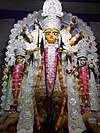Dakshin Rai
Dakshin Rai (Bengali: দক্ষিণ রাই, "King of the South") is revered deity in the Sundarbans in India and Bangladesh who rules over beasts and demons. He is regarded as the overall ruler of the Sundarbans.[1][2][3] The God is worshiped by all those who enter the Sunderban forests of West Bengal, for subsistence, irrespective of their caste, creed or religion.[4]
Narrative
In the Sealdah South lines there is the station Dhapdhapi. A few miles away is a Dakshin Rai temple. The residents of the area worship this Tiger God. Once belonged to the area of the Sundarbans. His domain stretches from the south Namkhana Kakdwip the Bhagirathi- Hooghly River Ganga in the west to the Ghatal Bakla district in the east as well as Khulna Jessore District of Bangladesh.[5] Every new moon (Amavashya) he is revered and appeased with animal sacrifices. Dakshin Rai also likes music and attracts musicians. The local tribes are trying their best to the 'King of the South' to please, by dancing and singing night after night.
Dakshin Rai is depicted with large whiskers. The body is slender and has a shiny, yellow tinge, which is decorated with tiger-like stripes. Drool drips from both sides of his mouth and he has a six-meter-long tail.
Inhabitants of the Sundarbans praying to Dakshin Rai or Bonbibi before venturing into the mangroves, as they believe this affords them protection. Natives of some tribes bind a mask with the face of Dakshin Rai to the back of their heads, so as to confuse or scare an approaching tiger and ward off its attack.[2]
References
- ↑ "Protection from the Gods:". lairweb.org.nz/. Retrieved 27 December 2012.
- 1 2 Valmik Thapar (1997). Land of the Tiger: A Natural History of the Indian Subcontinent. University of California Press. pp. 117–. ISBN 978-0-520-21470-5. Retrieved 27 December 2012.
- ↑ Swati Mitra (2011). Wild Trail in Bengal: Travel Guide. Goodearth Publications. pp. 18–. ISBN 978-93-80262-16-1. Retrieved 27 December 2012.
- ↑ "Dakshin-Ray". nationalmuseumindia.gov.in. Retrieved December 25, 2017.
- ↑ Gopendra Krishna Basu (2015). Banglar Loukik Debota (Bengali). Kolkata: Dey's Publishing. p. 150. ISBN 978-81-295-2582-6.
